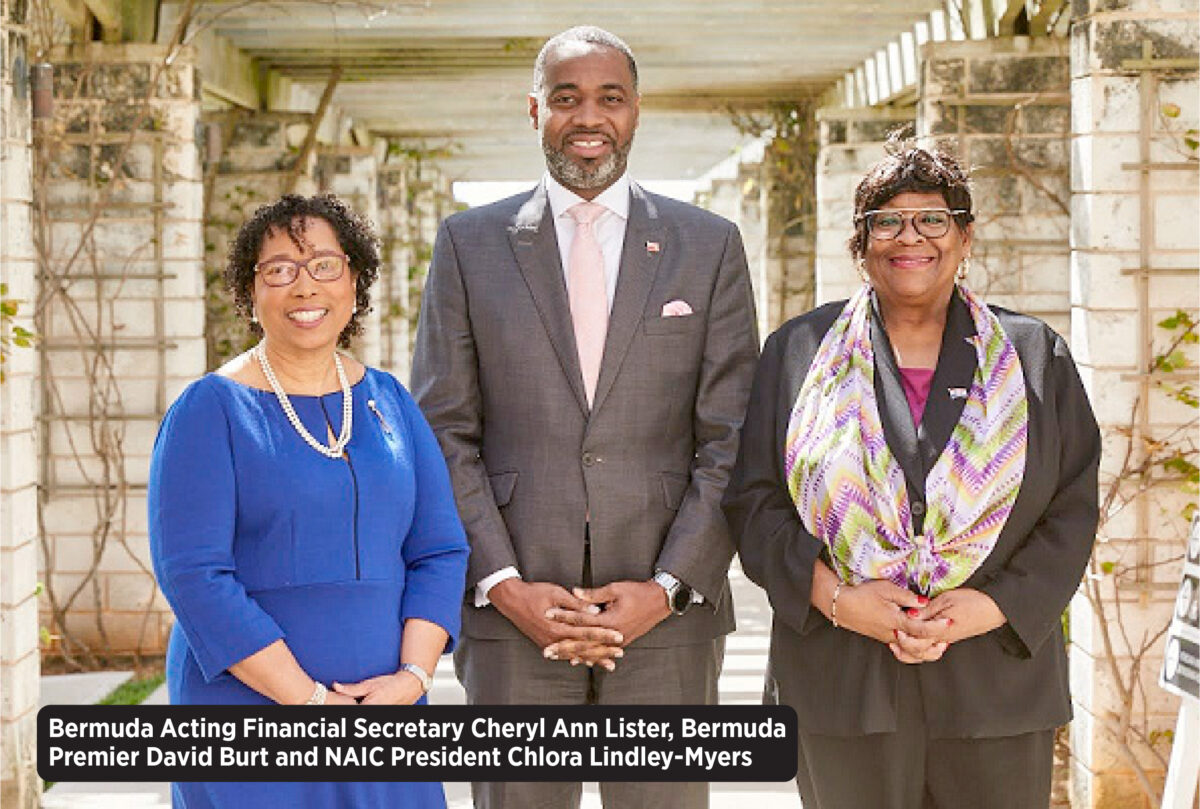The top of the ladder — with Chlora Lindley-Myers, Missouri insurance director

In her first job out of college, Chlora Lindley-Myers did life and health underwriting for Aetna. She later switched to property and casualty.
At night, she earned a law degree from the University of Connecticut.
That ambitious start gave her a well-rounded understanding of the insurance industry, with a side expertise in the law — all before she graduated from her 20s.
Sounds like a future regulator.
“I’ve always been interested in insurance because my grandmother and great grandmother, who I lived with most of the time growing up, used to have a guy come by every so often to pick up the premium,” recalled Lindley-Myers, director of insurance for Missouri. “It was just something that piqued my interest and I’ve been doing it ever since.”
In the decades since those early days, Lindley-Myers only added to her impressive resume of insurance roles. At the Tennessee Department of Commerce and Insurance, she headed up oversight, human resources and other functions.
She directed the Consumer Protection and Anti-Fraud Division of the National Association of Insurance Commissioners and oversaw examinations as chief compliance officer for the Kentucky Department of Insurance.
Lindley-Myers reached the pinnacle of the regulator profession this year when she took over as president of the NAIC, the first Black woman to hold the position.
Idaho Insurance Commissioner Dean Cameron wasn’t aware that Lindley-Myers had made that kind of history. She was simply a great candidate to lead the NAIC through an active period full of new industry challenges and disruptions, he said.
“She has a great sense of humor and a wonderful personality,” Cameron said. “And that’s besides her wealth of knowledge. On top of all of that, she has a memory like a trap. She remembers every person and who did what, and when.”
Turbulent times
Growing up in Atlanta during the 1960s, Lindley-Myers could not escape the massive societal anger all around the country. Looking back from 50-plus years of experience and wisdom, Lindley-Myers credits her mother, grandmother and great-grandmother for insulating her from racism.
Still, she remembers the passion of the fight for equality. Lester Maddox, elected governor of Georgia while Lindley-Myers was in high school, refused to serve Black customers at his popular Atlanta restaurant.
“I kind of was in my own neighborhood and was insulated by the neighborhood,” she said. “But it was also a situation where sometimes you couldn’t do things out in the open. So, things might have been done in people’s homes where people felt a lot more comfortable.”
But Atlanta in 1970 was also quite progressive by Southern standards at the time, Lindley-Myers recalled. Companies like Delta Airlines were bringing in flight attendants from the north, for example, and a growing Coca-Cola stocked Black restaurants as well as white.
The Atlanta Life Insurance Co., established by the city’s first Black millionaire, Alonzo F. Herndon, catered to the Black community.
“Those are the types of things that you kind of notice that you can build upon, because it was like, ‘Okay, if it worked there, maybe it will work here,’” Lindley-Myers recalled.
After graduating from Frederick Douglass High School in Atlanta, Lindley-Myers enrolled in Mount Holyoke College faraway Massachusetts. It would set the course of her life.
“My intent was to go into medicine,” she said. “Not sure if I really wanted to see patients, or if I wanted to do research, but I wanted to go into medicine.”
Things changed quickly as Lindley-Myers met leaders and mentors who would nudge her in different directions. People like Anna Jane Harrison, professor of chemistry at Mount Holyoke for nearly 40 years. She was the first female president of the American Chemical Society, and a big supporter of women in science.
People like celebrated novelist John Irving, whose breakthrough novel, “The World According to Garp,” was published in 1978. Irving finished up a three-year stint as assistant professor of English at Mount Holyoke that year.
“It was a lot of different people from a lot of different places,” Lindley-Myers said. “I sort of formed an attachment and had a feeling of wanting to belong, while understanding that the world that I had lived in was much smaller than the one I came to know at Mount Holyoke.”
Career moves
On her way to a career in medicine, Lindley-Myers realized it wasn’t a good fit. She’s a “germaphobe,” for starters. But studying psychobiology and how drugs produce a calming behavior in patients led to a job in insurance. Her Mount Holyoke network, this time included the late Connecticut Gov. Ella Grasso, led her to Aetna.
Lindley-Myers quickly settled in at Aetna, working on high-premium national accounts across the country. In time, she switched to property and casualty and ended up on the team underwriting the movie, “Twilight Zone,” in which actor Vic Morrow and two children were killed in an on-set helicopter accident.
The two child actors had been hired in violation of California law, which prohibits child actors from working at night or in proximity to explosions. Lawsuits related to the accident dragged on for a decade. Lindley-Myers came away with a newfound interest in legal strategy. She enrolled in the University of Connecticut School of Law.
After getting her law degree, Lindley-Myers practiced law some in between insurance industry positions. In the mid-2000s, she went to work for a friend in a Georgia public defender’s office.
“It was death penalty-type cases and you have to be certified,” she explained. “That was very challenging. When you do that kind of work, it was a lot different than just getting you off from a DUI. I mean, it was hardened criminals. People who were young but didn’t know any other way of life.”
While she enjoyed the job, despite the often-odd hours and crazy demands, Lindley-Myers said it was often mentally taxing.
“It’s just very, very hard on you because you’re dealing with people’s lives,” she said.
Lindley-Myers still holds a law license and takes on a case from time to time. But her focus shifted to insurance regulation full-time after close friend Julie McPeak was elected Tennessee insurance commissioner in 2011.
A few months later, Lindley-Myers joined her as deputy commissioner, and they worked side-by-side for the next five-and-a-half years.
Then came the call from then-Gov. Eric Greitens of Missouri offering his state’s insurance commissioner job to Lindley-Myers. She turned it down. Greitens offered it again and she turned it down. Finally, after a bit more back and forth, Lindley-Myers agreed to meet with the governor and took the job.
“It was not particularly something that I had sought to do, but you know, it was an opportunity, and I was going to take advantage of it,” she said.
Rising to the top
Greitens quickly fell out of favor, resigning in June 2018 amid sexual assault allegations. But Lindley-Myers thrived in Missouri. Nationally, the insurance commissioner office is marked by politics and high turnover, yet Lindley-Myers is in her seventh year.
Commissioners drive the NAIC regulatory agenda and Lindley-Myers quickly became heavily involved. She was elected secretary-treasurer in 2020, setting her on the path to the association presidency.
State insurance regulators have full plates at the moment, with climate, technology, reserving and private equity investment among the many issues dominating the agenda.
“I’m not sure, particularly last year, that she was super excited to ascend to be president,” Cameron said. “I think she has accepted the position well. It is extremely time-consuming, and an exhausting position. And I think she’s starting to feel some of that. But she’s done a tremendous job.”
When asked for her thoughts on the biggest issue facing insurance in 2023, Lindley-Myers does not hesitate. It’s artificial intelligence, cybersecurity and privacy, a tangled web of technology issues getting plenty of attention in several NAIC committees.
“We want people to understand that when you put that information out there, you may not ever know how it’s being manipulated against you and utilized against you,” she explained. “So, we’re looking at cybersecurity privacy issues.”
Like most of her colleagues, Lindley-Myers is a vocal advocate for the regulation of insurance remaining in state hands. She also cited race-based insurance discrimination as another central issue for the NAIC. In 2020, Lindley-Myers was among the co-vice chairs of a special committee focused on race and insurance. That committee has been meeting, collecting data and asking questions ever since.
“We want to make sure that race isn’t being used as a tool to object to certain classes of people or people as a whole,” she said.
As for Lyndley-Myers’ day job, Missouri Gov. Mike Parson’s term expires at the end of 2024. Parson has indicated that he does not expect to seek re-election. Insurance commissioner is an appointed position in Missouri.
Whatever happens on the political front, Lindley-Myers does not expect to retire anytime soon.
“If the new governor and I are destined to be together, I may be here,” she said. “If not, then I will move on and be happy in whatever role that I choose for myself at that particular time.”
InsuranceNewsNet Senior Editor John Hilton has covered business and other beats in more than 20 years of daily journalism. John may be reached at [email protected]. Follow him on Twitter @INNJohnH.






A Matter of Trust — With Carson Group’s Jamie Hopkins
Make way for the next generations: financial advice for young adults
Advisor News
- Is there a mismatch between advisor marketing and consumer preferences?
- State health plan users may see premium increases under SC House budget proposal
- Advisor: SEC trying to ambush my defense on bad annuity sales charges
- Partner split: Grant Cardone and Gary Brecka swap charges in dueling lawsuits
- 4 things every federal worker should do to safeguard their benefits
More Advisor NewsAnnuity News
Health/Employee Benefits News
- President of Insurance Brokerage Firm and CEO of Marketing Company Charged in $161M Affordable Care Act Enrollment Fraud Scheme
- STATEHOUSE: Senate Republicans approve limiting health insurance program for Hoosiers
- State health plan users may see premium increases under SC House budget proposal
- Senate Republicans approve limits on health insurance program
- Health agents ‘optimistic’ as a new administration takes charge
More Health/Employee Benefits NewsLife Insurance News
- While U.S. mortality spike is normalizing, 5 troubling trends continue
- Whole life vs. term life: The great debate
- Prudential launches OneLeave
- Annual financial and audit reports – JPMORGAN CHASE & CO.
- Conning research: Insurers must be flexible in the 2025
More Life Insurance News